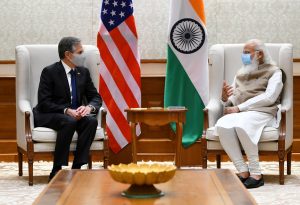On October 7, U.S. Deputy Secretary of State Wendy Sherman said that Washington has “no interest” in hyphenating India and Pakistan, and that it does not envision building a “broad relationship with Pakistan.” This statement comes at a time when the situation in Afghanistan is evolving. As the Taliban continue to consolidate power in the country, the overt role of Pakistan throughout the take-over process cannot be overlooked.
Despite behavior that often violates international norms, the U.S. continued to maintain positive relations with Pakistan. Pakistan was often viewed as a significant component in U.S. efforts to stabilize Afghanistan. This perception allowed Washington to turn a blind eye towards Pakistan’s supporting and granting haven to terror groups. Due to the assumed significance of Pakistan in U.S. Afghan policy, Washington’s relations with India had an unspoken limitation.
However, with the recent turn of events in Afghanistan, a possible reset in the overall India-U.S.-Pakistan dynamics is possible. There is an opportunity for India to maximize its relations with the U.S. without worrying about the Pakistan factor, as Washington will be more cautious in engaging countries like Pakistan, which continue to have direct links with groups like the Haqqani Network, a U.S.-designated foreign terrorist organization.
While it is interesting that Pakistan continues to downplay its active strategic interests and involvement in Afghanistan, its actions suggest otherwise. The presence of Pakistan’s Inter-Services Intelligence (ISI) chief in Kabul only a few days before the interim cabinet was announced, indicated the importance Pakistan placed in ensuring the presence of pro-Pakistan factions, particularly the Haqqani Network, in the Afghan power structure. True enough, Sirajuddin Haqqani, leader of the Haqqani Network, became in charge of the country’s interior ministry. This allows him to not only control intelligence agencies and the police, but also gives him the authority to appoint provincial governors.
Moreover, with the Haqqani Network at the top of the power hierarchy in Afghanistan, Pakistan will be able to safeguard its narrowly defined agenda in constraining India’s ability to effectively engage with the country. The ability of the Haqqani Network to follow through is far more certain than with other sections of the Taliban, such as the Doha faction led by current deputy Prime Minister Mullah Baradar. It may be recalled that in 2011, the chairman of the U.S. Joint Chiefs of Staff, Admiral Mike Mullen, described the Haqqani Network as a “veritable arm” of the ISI.
Despite this, Pakistan has managed to maintain a favorable position in U.S. policy in Afghanistan over the past two decades. It is quite clear that the large amount of money given to Pakistan to carry out counterterrorism activities was not used for that purpose. Moreover, despite U.S. military aid to Pakistan decreasing by 60 percent between 2010 and 2017, the country’s behavior and involvement in destabilizing activities did not cease. This can be attributed to its belief that it can find alternatives for financial aid from China and the Gulf countries.
Yet Prime Minister Imran Khan continues to depict Pakistan as a victim of U.S. ingratitude. Meanwhile, many Afghans blame Pakistan for the rise of the Taliban in Afghanistan. In fact, even before the fall of Kabul former President Ashraf Ghani reprimanded Pakistan for supporting the Taliban.
The withdrawal of the U.S. from Afghanistan and the rise of the Taliban offers an opportunity for Washington to recalibrate its overall South Asia policy. While the U.S. has traditionally viewed Pakistan as a partner for peace in the region, particularly in ensuring a rules-based order in Afghanistan, the reality lays bare a miscalculation on the part of Washington, one that has gone to the extent of marginalizing India’s role in crucial talks. Eventually, this also had a significant impact on the function of the strategic partnership between India and the U.S.
India is a natural and like-minded partner for peace and stability in Afghanistan and the greater South Asian region. India has earned the goodwill of the Afghans and has invested over $3 billion, which includes investment in over 400 infrastructure projects throughout the country. India has participated in Afghanistan’s development through the building of key infrastructure projects such as roads, dams, electricity transmission lines, solar panels, and telecom networks. India does not project a narrowly defined strategic ambition with its investment in Afghanistan; rather, it seeks to take part in effectively creating a conducive environment for growth for the Afghans.
Until recently, the U.S. engaged with Pakistan with the hope of bringing peace in Afghanistan; however, this significantly backfired. In fact, former U.S. National Security Adviser Lt. Gen. H.R. McMaster recently emphasized that, “We have to stop pretending that Pakistan is a partner.” “Pakistan has been acting as an enemy nation against us by organizing, training, and equipping these forces and by continuing to use jihadist terrorist organizations as an arm of their foreign policy,” he said.
With all the facts laid out in clear sight, the current U.S. administration must pave the way and significantly recalibrate its South Asia policy given the turn of events in Afghanistan. Furthermore, the U.S. must continue to maximize its partnership with India to ensure the preservation of the rules-based order not only in Afghanistan and South Asia but also the greater Indo-Pacific. Collaborating further with Pakistan in Afghanistan will only hit an inevitable dead-end and create more potential instability in the region. Moreover, the U.S. will have to be critical with the next steps it plans to take, given the skepticism of its allies since its withdrawal.
Sherman’s comments come at a time when changes are taking place in the geopolitical landscape and signals a positive shift in India-U.S. relations. As India and the U.S. converge on a number of issues, such as the need to have a rules-based approach for Afghanistan, the time is ripe to further maximize the bilateral relationship without the limitations imposed by the Pakistan factor.

































